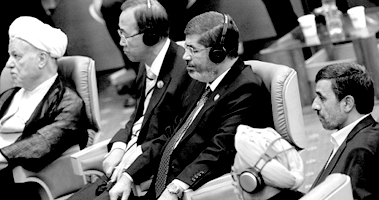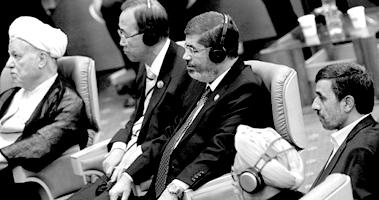
Iranian leaders are masterful in manipulating the true reality on the ground in their country and obsessively addicted to taking advantage of any political opportunity to strengthen their own narrative of events. This week’s Non-Alignment Movement Summit in Tehran was one such occasion.
Trapped in two major crises–one Iran’s nuclear program and the subsequent series of sanctions adopted by the UN and the US, the other a series of UN resolutions against the country’s human rights record, which together have not only weakened Iran politically and economically but also created an oppressive image of the regime–Iranian leaders wanted to show they are still thriving.
As Tehran planned the summit, officials made sure to bring in as many heads of state from as many countries as possible, even those insignificant to Iran’s economy or national security, to fabricate a fairytale of influence and popularity between nations. In orchestrating the show, the presence of two men was pivotal: UN Secretary-General Ban Ki-moon and Egyptian President Mohamed Morsi.
In the opening ceremony of the summit, Morsi, the first Egyptian president to travel to Tehran since the 1979 Revolution, harshly criticized Syrian president Bashar al-Assad’s regime and said it has lost its legitimacy. Iranian president Mahmoud Ahmadinejad, seated beside him, became so uncomfortable with these words that he started playing with the translation buttons in front of him, pretending not to listen. Iranian television, well-versed in damage control and spinning facts to match the official narrative, totally misled its audience by changing the lines in which Morsi slammed al-Assad, Tehran’s closest ally in the region.
The president of Egypt left Tehran a few hours later, his speech having challenged Iran’s carefully crafted projection of unity and support from a powerful regional Muslim country in the Middle East. The Secretary-General was not nearly as bold.
He did not visit any of Iran’s prisoners of conscience, he did not obtain any guarantee from Iranian officials that they would respect their obligations, and he did not publicly pressure Iranian officials on their human rights record.
Given that Iranian authorities have done everything in their power in recent years to undermine decisions made by various UN bodies, from the Security Council to the Human Rights Council to the General Assembly, Ban Ki-moon’s presence in Tehran was not necessarily expected. Iranian officials have repeatedly attacked the motives behind UN mechanisms, questioned the independence of the decision-making process in the UN, and downplayed its role on the international stage.
In keeping with this policy, Iranian officials have ignored the vast majority of communications from the UN thematic mandate holders and have refused to allow the UN Special Rapporteur on Human Rights in Iran to even enter the country. And yet, Iranian officials welcomed the UN Secretary-General to the country with open arms, hoping that in such tough times for Tehran, he lends them legitimacy–precisely at a time when they want to show the rest of the world their anti-UN campaigns on both the human rights and nuclear fronts. But Ban still decided to go to Tehran.
This put the highest-ranking UN diplomat in a very delicate situation with high expectations and raised a simple question: could the Secretary-General, while in the country and meeting the highest-ranking Iranian officials, gain anything substantial regarding Tehran’s two major crises, in return for the boon his presence in Tehran granted the Iranian propaganda machine?
Right before his departure from New York, hundreds of Iranian activists and academics, in a letter submitted to his office, asked Ban to visit the two Iranian opposition leaders, Mir Hossein Mousavi and Mehdi Karroubi, who have been under house arrest for more than a year and a half, while in Tehran.
Reports from Tehran indicate that the majority of Ban’s criticism of Iran was around the country’s nuclear program, the Supreme Leader’s allegations against Israel, and Tehran’s role in the Syrian conflict. Although his spokesman said that he raised the issue of human rights in the country, it appeared that was not at the top of his list.
Missed Opportunities
Evin Prison, which holds the majority of the prisoners of conscience in Iran, is just a few miles away from where UN Secretary-General Ban Ki-moon stood to take pictures with Iranian President Mahmoud Ahmadinejad, and yet he did not take the opportunity to visit the facility.
On Tuesday, August 28, Ban’s spokesperson assured the international community that he “intends to discuss human rights with the Iranian authorities, including at the highest level,” according to the Guardian. On Wednesday, August 29, Ban announced, “We have discussed how United Nations can work together with Iran to improve the human rights situation in Iran. We have our serious concerns on the human rights abuses and violations in this country,” according to the AP. But the only public mention the Secretary-General made of human rights was in remarks aimed at the larger audience of the Non-Aligned Movement, never targeted to Iran: “Listen to the appeals of people–for justice, for human rights, for dignity.”
On Thursday, August 30, speaking at the Iranian Foreign Ministry’s School of International Relations, Ban said, “I have urged the authorities during my visit this time to release opposition leaders, human rights defenders, journalists and social activists to create the conditions for free expression and open debate. I also urge Iran to strengthen cooperation with the human rights mechanisms of the United Nations, in particular the Special Rapporteur. I have discussed this matter with your leadership.”
But a few sentences to a group of professors stating that Ban urged Iranian officials to do such-and-such was too little, too late. If Iranian leaders don’t care about resolutions signed by dozens of countries, why should they really care about remarks made behind closed doors?
In his visit to Tehran, the Secretary-General had an excellent opportunity to discuss serious human rights issues with Iranian officials, not only behind closed doors–where Iranian officials excel at making promises and promptly forgetting about them in public–but transparently, before the eyes of the world.
It is not clear to what extent, if any, the Secretary-General has been able to discuss the situation of human rights in Iran, whether he has made any progress in holding authorities accountable, in asking Iranian officials to cooperate with UN human rights bodies and to ensure cooperation with its mechanisms, or in guaranteeing any such agreements take effect.
After this visit, Iranian officials have no incentive to change their policies or their behavior with regards to human rights violations, as they have already seen that they can score political points and have the leader of the largest international organization in the world lend them legitimacy without having to cede any ground or making any compromises.
Secretary-General Ban Ki-moon missed a great opportunity to use his trip to influence the situation of human rights in Iran. The least he can do now is to tell the world what discussions he actually had with Iranian officials, what they promised to do to change the course of the human rights crisis, and whether he was able to secure a visit to Tehran by UN Special Rapporteur Ahmed Shaheed. And what about visiting the captive opposition leaders?
Shedding light on those discussions and openly calling for Iranian authorities to take a number of concrete steps toward respecting their international commitments may be a way to salvage the scraps of this squandered opportunity.

